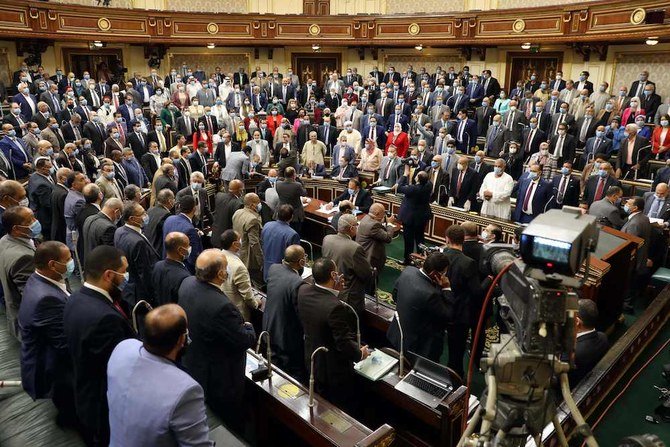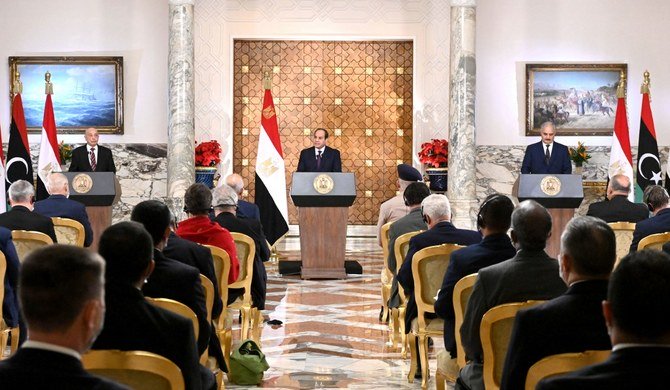



CAIRO: Egypt’s parliament on Monday authorized the deployment of troops outside the country after the president threatened military action against Turkish-backed forces in Libya.
The move could bring Egypt and Turkey, which support rival sides in Libya’s chaotic proxy war, into direct confrontation.
President Abdel Fattah El-Sisi has called the strategic coastal city of Sirte a “red line” and warned that any attack on the town would prompt Cairo to intervene militarily to protect its western border with the oil-rich country.
Egypt’s House of Representatives, packed with supporters of President Abdel Fattah El-Sisi, approved plans to send troops to “defend Egyptian national security” after a closed-door session.
Libya was plunged into chaos when a NATO-backed uprising in 2011 toppled longtime dictator Muammar Qaddafi, who was later killed. The country is now split between a government in the east, allied with military commander Khalifa Haftar, and a UN-supported government in Tripoli, in the west.
The conflict has escalated into a regional proxy war fueled by foreign powers pouring weapons and mercenaries into the country.
Egypt has been backing the eastern-based Libyan forces in the conflict while Turkey backs the forces in the capital, Tripoli. Egypt’s president warned in June that any attack on Sirte or the inland Jufra air base would prompt Cairo to intervene militarily, purportedly to protect its western border with Libya.
“Egypt will spare no efforts to support the sister Libya … to overcome the current critical crisis,” the Egyptian presidency said in a statement after a meeting of the National Defense Council on Sunday that was chaired by El-Sisi.
Along with Egypt, Haftar is also backed by the United Arab Emirates and Russia, while in addition to Turkey, the Tripoli forces are aided by Qatar and Italy.
The US has sent mixed signals to the rival sides over the course of the war, but has become increasingly concerned about Moscow’s growing influence in Libya, where hundreds of Russian mercenaries backed a failed attempt by Haftar’s forces to capture Tripoli.
In a call on Monday with US President Donald Trump ahead of the parliament vote, El-Sisi emphasized Egypt’s aim to “prevent further deterioration of security in Libya,” according to a statement from the Egyptian presidential spokesman. It said the two leaders agreed on maintaining a cease-fire and avoiding a military escalation in Libya.
Egypt’s state-run Al-Ahram daily reported on Sunday that the vote in parliament was intended to mandate El-Sisi to “intervene militarily in Libya to help defend the western neighbor against Turkish aggression.”
Last week, El-Sisi hosted dozens of tribal leaders loyal to Haftar in Cairo, where he repeated that Egypt will “not stand idly by in the face of moves that pose a direct threat to security.”
Libya’s east-based parliament, the sole elected body in the oil-rich country, also urged El-Sisi to send troops.
Stephanie Williams, acting head of the UN support mission in Libya, on Monday called for an “immediate cease-fire … to spare the 125,000 civilians who remain in harm’s way and for an end to the blatant violations of the UN arms embargo.”
Her comments came following her meeting on Sunday with the president of neighboring Algeria, Abdelmadjid Tebboune.
Haftar’s forces launched an offensive to take Tripoli from the UN-supported government in April last year but their campaign — which had stalemated after reaching the outskirts of the Libyan capital — suffered a blow last month when the Tripoli-allied forces, with Turkish support, pushed them back and gained the upper hand in the fighting.
The Tripoli forces retook the capital’s airport, all main entrance and exit points to the city and a string of key towns in the region. They pushed on eastward, vowing to also retake Sirte, which Haftar captured earlier this year. Both sides have been mobilizing forces for weeks.
Capturing the city, Qaddafi’s birthplace, would open the door for the Turkish-backed forces to advance even farther eastward and potentially take vital oil installations, terminals and fields now under Haftar’s control.
AP